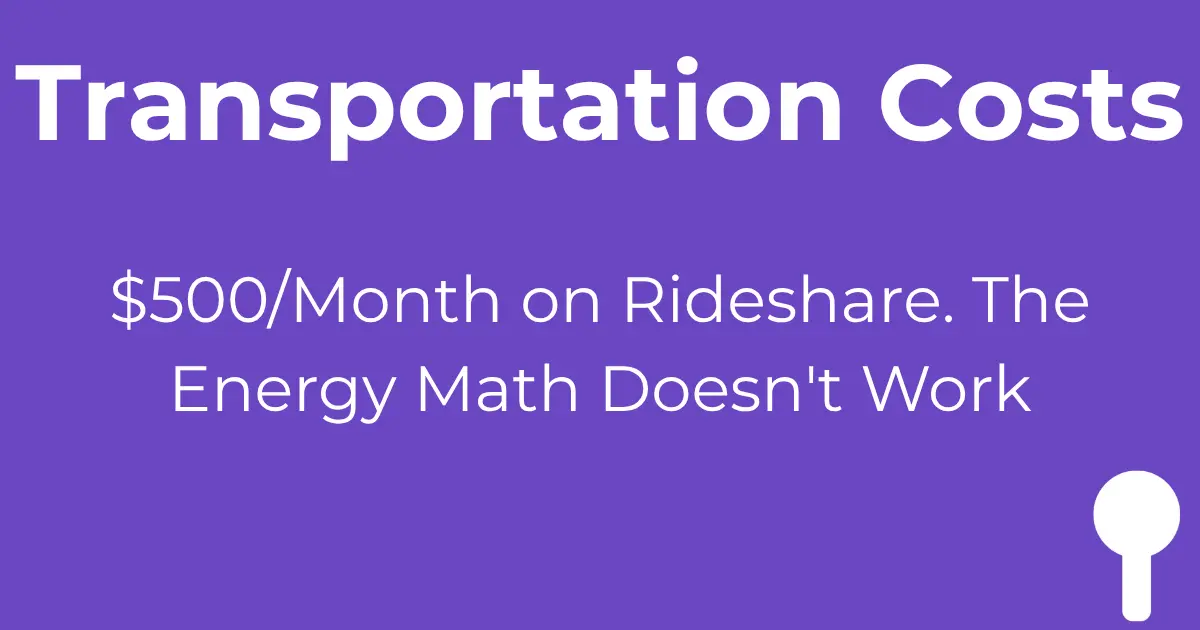
I Spend $500/Month on Uber for Work. That's 1/4 of My Income.
I don't drive.
Driving is very uncomfortable for me. My mom taught me how to drive years ago. Constant yelling, shouting, and aggressive pulling made driving on the road very undesirable.
So I use rideshare. Uber and Lyft. Three days a week. Friday through Sunday.
The Financial Math
Roughly $20 per ride. I pay both to get to work and to go home.
I work 3 days/week. That’s 6 rides/week (to work + home). That's 24 rides per month.
24 rides × $20 = $480-$500 per month.
I make roughly $2,100 after taxes.
I'm spending 1/4 of my income JUST getting to work.
The Energy Math
Scheduling a ride drains 3-4 energy before I even leave. The executive function demand—checking app, estimating arrival time, planning when to request pickup—exhausts me before I'm out the door.
What drains me before I even arrive:
- requesting the ride at the right time
- watching ETAs change
- surge pricing uncertainty
- small talk + masking
- unsafe driving sensations (braking, lane changes)
I never know if I'm going to arrive at work in an hour or 20 minutes. Surge pricing adds unpredictability, which further drains my limited income.
Drivers make small talk constantly once I'm inside the car. The social exhaustion from masking my discomfort—pretending I want to chat when I'm already drained—costs me most of my energy before I even get to work.
I haven't clocked in yet and I'm already at 5/10 energy.
The Unsafe Driving
Unpredictable and unsafe driving habits from strangers on the road drain my energy. Sudden braking, aggressive lane changes, running lights—this sensory overload has occurred several times with Uber and Lyft drivers not following the rules of the road.
I'm paying $500/month to be drained before work even starts.
"Just Get a Car"
My family suggests this all the time.
Not only are cars hard to save up for—rideshare eats most of my income—but unpredictable people on the road with unsafe driving habits would drain energy even more.
The driving trauma is still there. Getting a car doesn't fix that.
My mom's constant yelling while teaching me to drive left me with anxiety around driving that compounds the sensory overload I'd experience navigating traffic. I'd be paying car payments while still losing massive energy to the actual driving.
The Alternatives Don't Work Either
Public transit could help. I've considered it.
The problem? It's unpredictable in the times it arrives.
Different jobs could help, but they're much farther from my home. That would cost me MORE each month to get there.
I'm trapped. Every option has major tradeoffs.
What Tracking Showed Me
I quickly picked up how unpredictable getting a ride is.
It takes 18 minutes to get home. Most rides I receive are 20 minutes away. I'm spending twice the amount of time waiting for a ride as the ride itself takes.
This taught me that scheduling rides in advance is a must. Or scheduling them an hour before my shift starts.
This barely works, but it's better than nothing.
The Reality
I spend $500/month and lose 3-4 energy per ride just to get to a job that destroys my remaining energy.
This cycle keeps me in autistic burnout I'm spending money and energy to get to a place that drains me further, with no financial capacity to escape because rideshare eats 1/4 of my income.
The math doesn't work. Financially or energetically.
Tracking helps me see the pattern. Make small adjustments. But it can't fix systemic barriers.
I'm Omari, a 23-year-old autistic adult who's been managing chronic burnout for 5+ years while working warehouse shifts.
This is why I'm building Spoons. To see what's draining me. To know when the math doesn't add up. To escape jobs that cost more than they pay.
Launching April 2026. getspoons.app - One email when it's ready. No spam.
— Omari
Note: I'm sharing my personal experience as an autistic adult, not medical advice. If you're experiencing severe burnout or crisis, please consult a healthcare provider familiar with autism.
